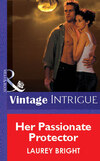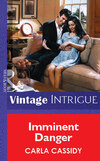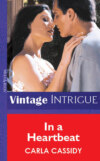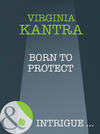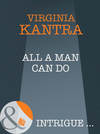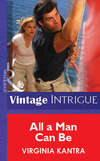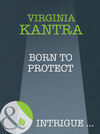Loe raamatut: «Guilty Secrets»
Nell’s heart thumped.
She turned. And there was Joe, his thumbs in his belt loops and a gleam in his eye, lean and tough and hot. She was so glad to see him, it made her cross.
“What are you doing here?”
“I came to see you,” he said, just the way she’d hoped he would four days ago when he’d brought Laila to the clinic to have her baby.
Four days ago. Four days. Without a phone call.
She lifted her chin. “Why? You finished your story.”
Joe nodded, still with that unsettling glint in his eyes. “That’s why.”
“I don’t understand,” Nell said.
“You mean you don’t remember.” He took a step closer, taking up more space and more oxygen than a man had a right to. “I told you that first night. Once I file the story, I don’t have any rules against taking you to bed.”
Dear Reader,
Welcome to another month of excitement and romance. Start your reading by letting Ruth Langan be your guide to DEVIL’S COVE in Cover-Up, the first title in her new miniseries set in a small town where secrets, scandal and seduction go hand in hand. The next three books will be coming out back to back, so be sure to catch every one of them.
Virginia Kantra tells a tale of Guilty Secrets as opposites Joe Reilly, a cynical reporter, and Nell Dolan, a softhearted do-gooder, can’t help but attract each other—with wonderfully romantic results. Jenna Mills will send Shock Waves through you as psychic Brenna Scott tries to convince federal prosecutor Ethan Carrington that he’s in danger. If she can’t get him to listen to her, his life—and her heart—will be lost.
Finish the month with a trip to the lands down under, Australia and New Zealand, as three of your favorite writers mix romance and suspense in equal—and irresistible—portions. Melissa James features another of her tough (and wonderful!) Nighthawk heroes in Dangerous Illusion, while Frances Housden’s heroine has to face down the Shadows of the Past in order to find her happily-ever-after. Finally, get set for high-seas adventure as Sienna Rivers meets Her Passionate Protector in Laurey Bright’s latest.
Don’t miss a single one—and be sure to come back next month for more of the best and most exciting romantic reading around, right here in Silhouette Intimate Moments.
Yours,

Leslie J. Wainger
Executive Editor
Guilty Secrets
Virginia Kantra
VIRGINIA KANTRA
credits her enthusiasm for strong heroes and courageous heroines to a childhood spent devouring fairy tales. A three-time Romance Writers of America RITA® Award finalist, she has won numerous writing awards, including the Golden Heart, Maggie Award, Holt Medallion and Romantic Times W.I.S.H. Hero Award.
Virginia is married to her college sweetheart, a musician disguised as the owner of a coffeehouse. They live in Raleigh, North Carolina, with three teenagers, two cats, a dog and various blue-tailed lizards that live under the siding of their home. Her favorite thing to make for dinner? Reservations.
She loves to hear from readers. You can reach her at VirginiaKantra@aol.com or c/o Silhouette Books, 233 Broadway Suite 1001 New York, NY 10279.
To the ones who are living with grace and courage one day at a time.
Special thanks to my sister Pam for letting me pick her brain;
to Pam Baustian, Melissa McClone and Judith Stanton;
and, always, to Michael.
Contents
Chapter 1
Chapter 2
Chapter 3
Chapter 4
Chapter 5
Chapter 6
Chapter 7
Chapter 8
Chapter 9
Chapter 10
Chapter 11
Chapter 12
Chapter 13
Chapter 14
Chapter 15
Chapter 16
Chapter 17
Chapter 1
“Man here asking for you, Nell,” Billie announced as she hustled past the nurses’ station.
Eleanor Dolan didn’t need a man. She needed six more hours in her day and a forty-percent increase in her operating budget. Or three extra-strength Tylenol and a new pair of orthopedic shoes.
Not that she had a shot at getting any of those things anytime soon. She was used to not getting what she wanted, but she’d learned to make do with what she had. She wasn’t settling, exactly. She was…surviving.
Nell sighed and made another note on her patient’s medical chart. “Is he a regular?”
The other nurse shook her close-cropped head. This week Billie’s hair was an improbable shade of red that glowed against her dark skin. “Nope. But you’ve got to see this one, Nell. Seriously.”
Monday mornings at the free clinic were like Saturday nights in the E.R.—a Saturday night when the moon was full and the Chicago Bulls were losing. “You’ve got to see this one” could mean anything. AIDS. Asthma. A cut that needed stitching.
“Right,” Nell said briskly. “Give him the forms and get him into an examining room. I’ll be right there.”
She pushed open the door to Exam Eight a few minutes later prepared to find the patient turning blue or bleeding. She wasn’t prepared for…
Oh, my.
Nell realized her jaw had dropped and closed her mouth with an audible snap. Billie was right. If you were female and breathing, you had to see this one. Seriously.
He wasn’t handsome. Dr. James Fletcher, the volunteer pediatrician, was handsome, his features balanced, his eyes kind, his teeth white and straight.
The man in Exam Eight had sharp, hooded eyes and a smile like a shark. His face was lined, lived in, with enough stubble on his jaw to suit a movie star. Or some homeless drifter. Judging from the quality of his upscale safari jacket, Nell voted for movie star. Although considering the jacket’s age, maybe she’d better go with drifter. He looked tough. Streetwise. Dangerous.
Nell distrusted him on sight.
She clutched his chart and forced a smile. “I’m Eleanor Dolan, the nurse-practitioner,” she said crisply. “Sorry to keep you waiting, Mr., ah—” She glanced at the sheet clipped to the front of the folder. It was blank, damn it. Somebody should have helped him if he was having trouble filling out the forms.
“Joe,” the man supplied. He was still smiling, but his eyes were watchful.
All right, he spoke English. But maybe he was worried about the law or Immigration. Maybe he was embarrassed about his financial situation. Maybe he couldn’t read.
She uncapped her pen, determined to help him. That was what she did. Help people.
“Last name?” she prompted.
“Reilly.”
She wrote it down. “Do you have insurance, Mr. Reilly?”
He slouched against the examining-room table, his hands shoved in his jacket pockets. “As long as I keep my job, I do.”
She mustered her patience and lifted her pen. “I don’t know if you’re aware of our policy, Mr. Reilly, but the Ark Street Clinic provides medical assistance to people who are uninsured. Your having a job certainly doesn’t disqualify you from seeking care. Many of our patients work two or more part-time jobs and earn too much to qualify for Medicaid. But if your employer provides insurance—”
“I work for the Examiner,” he said.
The Chicago Examiner was the city’s largest and second-oldest daily newspaper. Nell had been calling and e-mailing both the Metro department and the features editor for months, trying to provoke the kind of publicity that would attract donations to her clinic.
Oh my God.
“You’re Joe Reilly,” she said.
“Yeah.”
“The journalist.”
“Guilty.”
“You’re here to write about the clinic.”
Joe kept his hands in his pockets. “That was the idea.”
His editor’s idea. Not Joe’s.
Actually, his editor’s idea was for Joe to profile the woman standing in front of him, Eleanor Dolan, the driving force and guiding light of the North Side’s Ark Street Free Clinic. The so-called Angel of Ark Street.
Joe thought the idea was hokey and the name probably undeserved. The past year had left him with a jaded view of women and a jaundiced view of the medical profession.
But he could see how the name might have stuck. Eleanor Dolan looked enough like an angel, the kind that showed up in Russian icons flanking the Madonna—pale, blond and severely beautiful. She was even dressed in white, a lab coat, instead of a printed smock like the other nurses wore.
A vain angel? Joe wondered. Not that it mattered. The Dolan woman could dress like the queen of England in white gloves and a blue hat and it wouldn’t make her newsworthy.
Although it might be interesting to see what was under that lab coat.
Even if Eleanor Dolan was the angel his boss made her out to be, Joe was no saint. And he was getting mighty tired of self-denial. So he let himself look, appreciating the slope and curve of Dolan’s sweater between the open panels of her coat. Very nice.
Of course she caught him staring.
She frowned. “I wasn’t expecting you until tomorrow.”
He shrugged, enjoying the flash of annoyance in her eyes. “I had some time free today.”
“I don’t. Monday is our busiest day.”
“I noticed.”
“Some of our patients wait outside for two hours before the clinic even opens.” She must have realized scolding wasn’t likely to generate the kind of publicity she wanted, because she softened her tone. “Please come back tomorrow. We’ll be fully staffed then, and I can give you a tour.”
Joe knew all about official tours. He’d been escorted by experts in Haiti, Kosovo and Baghdad. The skin prickled on the back of his neck.
Which was ridiculous. Eleanor Dolan didn’t have anything to hide. She was just anxious to make a good impression.
“That’ll be great,” Joe said. “In the meantime, any objections if I stick around? Make some general observations, maybe ask a few questions?”
Dolan opened her mouth. Closed it, and tried again. “Not at all. I’ll have to ask you to stay in the waiting area, though. To protect our patients’ privacy.”
Okay, maybe she wanted to make a good impression.
And maybe she was a little bit of a control freak.
“Sure, no problem,” Joe said.
And it wasn’t, he thought as she led him back to the lounge. He wasn’t Ed Bradley from 60 Minutes. Hell, he wasn’t even Joe Reilly, wonder-boy foreign correspondent anymore. He was just Joe Reilly, staff writer, and unless Nurse Dolan was dealing drugs from the clinic waiting room, she had nothing to fear from him.
Nell regarded the clinic pharmacist in disbelief. “What do you mean, you think we might be missing units from the narcotics closet?”
She heard her voice rising and struggled to contain it. She didn’t want to scare the patients.
But Ed Johnson, the pharmacist, flinched. He looked almost ill, slack and pale, his forehead beaded with sweat.
Nell sympathized. She felt sick herself. “How many units?” she asked. “And which drugs are missing?”
Ed rubbed his shiny face with one hand. “I don’t know, exactly.”
This was bad. Any theft or significant loss of controlled substances had to be reported to the nearest DEA office as well as to the police. But if she didn’t even know what was missing…
“When did you take inventory?”
Ed’s gaze slid from her. “I was keeping a tally,” he mumbled.
“Ed.”
At her tone, Lucy Morales, one of the RNs, looked over.
Nell took a deep breath and tried again. “You’re supposed to take inventory twice a day.”
“I know,” Ed said miserably. “But we were busy.”
Nell’s patience stretched like a rubber tourniquet about to snap. She loved her job. She did. But she was sick of covering for other people’s mistakes, tired of making herself responsible for everyone and everything.
Only of course she couldn’t yell at poor Ed. He was past retirement age. And he needed this job, needed the poor salary that was all she could afford to pay him.
“All right,” Nell said. “I want you to take inventory now and then again before you go home tonight. Let’s make sure we have a problem before we start worrying about how we’re going to solve it.”
She stomped down the hall, feeling the ghosts of her past breathing behind her. The last thing she needed was to make waves with the DEA. Especially with sharp-eyed, smiling reporter, Joe Reilly, cruising around like a shark scenting for blood.
Nell leaned over the counter that separated the office area from the medical aisle. “Hi, Melody. Has Mr. Vacek come in today?” Stanley Vacek was one of her regulars, an elderly man with a thick eastern European accent and a perpetual scowl who suffered from high blood pressure.
Melody King looked up from the computer screen and blinked, her lavender eyelids startling in her pale face. The office manager had long, mousy brown hair and an abused expression. “He was here a while ago. But I think he left.”
“He can’t leave,” Nell said. “He’s hypertensive.”
“That don’t stop him from walking out the door,” Billie observed on her way to take the vitals of the patient in Exam Two.
Nell frowned. “But he needed a refill on his medication.”
Melody stuck out her lower lip. “I didn’t ask him to leave.”
“No, of course not,” Nell said, automatically reassuring.
“I think he got upset the other guy was asking questions,” the office manager said.
Nell’s stomach sank. “What other guy?”
But she knew.
“That Mr. Reilly,” Melody said, confirming Nell’s fears. “I think Mr. Vacek thought he was from INS or something.”
“He’s not,” Nell said.
“I didn’t say I thought he was an immigration officer.” Melody lowered her voice. “I think he’s a cop.”
Lucy Morales pulled a chart from the stack on the counter. “Are we talking about the guy in the jacket? Because I think he’s hot.”
Irritation ran under Nell’s skin. Why? Because she agreed with Lucy? She pushed the thought away.
“Hot or not, he doesn’t have the right to disturb our patients.” She marched into the waiting room, relieved to have someone she could yell at without feeling guilty.
Patients filled the lines of chairs. A shrieking toddler flung himself backward off his mother’s lap. An elderly woman sat, her lined face passive, her hand clutching her husband’s thin arm.
Reilly was folded onto one of the uncomfortable chairs, one long leg stuck out in front of him. He was smiling and talking over the head of a little girl in purple barrettes to her mother, who was smiling and talking back.
Okay, so she couldn’t yell.
He’d still scared off grumpy Stanley Vacek. He scared Nell. Until the problem—potential problem—with her drug inventory was resolved, she didn’t want him in her clinic. For her patients’ well-being, for her own peace of mind, he had to go.
Nell cleared her throat. Reilly looked up.
“I’m sorry. I have to ask you to come back tomorrow.”
Reilly straightened slowly. He wasn’t a big man, only a few inches taller than Nell’s own five feet eight inches, but his physical impact was undeniable. His eyes, a dark, deep blue, were filled with weary humor. Cops’ eyes, Nell thought. Priests’ eyes. The kind of eyes that invited confidences and promised absolution.
Only she wasn’t confessing anything, and she no longer looked for forgiveness from the church. From anyone.
“What’s the problem?” Reilly asked.
Nell jerked her head toward the door. Reilly followed her across the room. She felt his gaze on her back like a hand.
She turned to face him, torn between apology and irritation. “You have to leave. You’re making my patients nervous.”
Reilly glanced back at the child’s mother, watching with undisguised curiosity from the row of chairs. “I was just making conversation.”
Was she being unfair to him? “You were asking questions.”
“So?”
“So, they think you’re a cop.”
“Not me,” he said. “My brother.”
Nell nearly groaned.
She liked cops. Most cops. Most of the time, nurses and cops were on the same side of the fence, separated from the public who depended on and distrusted them. They shared the same exhaustion, the same frustration, the same brand of black humor. But at this moment, with Ed Johnson frantically counting units of Vicodin, Meperidine and Oxycodone in the back room, Nell regarded the police with the same deep misgiving she felt toward…well, toward the press.
She moistened her lips. “Your brother is a police officer?”
Reilly nodded.
“Here in Chicago?”
He cocked his head. “Yeah. But we don’t talk much, if that’s what’s worrying you.”
She stiffened. “I’m not worried.”
“Scared, then.”
“I’m not scared.”
“Prove it.”
“What?”
Reilly shoved his hands in his jacket pockets. “Prove it,” he repeated, his gaze steady on her face. “Have dinner with me tonight.”
Hello. That came totally out of left field. He’d flirted with that child’s mother more than he had with her.
“Why?” Nell asked suspiciously.
He raised both eyebrows. “You need a reason to have dinner?”
“I need a reason to have dinner with you. I don’t know you.”
“You can get to know me over dinner.”
She shook her head, at least as flattered as she was intimidated by his invitation. “Thanks, but—”
“I write a much better story when I’m familiar with my subject.”
“I am not your subject.”
His eyes laughed at her. “So, we’ll talk about your clinic. I’ll even bring my notebook.”
He stood there, smiling and sure and annoying as hell. She had to get rid of him without tipping him off or pissing him off.
“Fine,” she said abruptly. “I’m out of here at seven.”
“Long day,” he observed.
“Yes.” And then, because she needed to have the last word, she said, “And now it will be a long night.”
His smile spread slowly, making the heat bloom in her cheeks.
“We can hope,” Reilly said.
She was late.
Nell’s bag slapped against her hip as she turned to tug the clinic door closed. Her purse was stuffed with printouts of all the prescription medicines donated by pharmaceutical companies and their reps, all the drugs purchased and all the painkillers dispensed by the pharmacy in the past three months. Tonight she’d crunch the numbers and reassure herself that there were no slipups, no mistakes in the clinic’s accounting of controlled substances.
She couldn’t afford a mistake.
Not another one.
Reilly was waiting on the sidewalk in front of the clinic, one shoulder propped against the dirty brick. He straightened when he saw her.
“What’s wrong?” he asked, his eyes narrowing in concern. Or suspicion.
Nell stitched a smile on her face that would have done justice to a corpse at a wake. “Why would you think something’s wrong?”
“That’s a reporter’s trick,” he observed.
She tested the door handle to make sure it was locked. “What?”
“Answering a question with another question.” Reilly smiled winningly. “Cops do it, too.”
“Nothing’s wrong,” Nell said. Her bag weighed on her shoulder, heavy as conscience.
“You’re late.”
“We had a little excitement at the end of the day.” She’d spent the past half hour closeted with Ed, painstakingly checking and rechecking his inventory numbers.
Reilly strolled toward her. “What kind of excitement?”
She shrugged. “Our ultrasound machine is on the fritz.” That much, at least, was true. “One of our patients has a possible fibroid, and I had to convince her to go to the E.R.”
“Is that bad?”
“It is if she decides not to make the trip. Most of our patients aren’t poor enough to qualify for Medicaid, but that doesn’t mean they can afford a visit to the emergency room.” She looked at him pointedly. “We really need new diagnostic equipment.”
Reilly stuck his hands in his pockets. “Is this a date or a fund-raising drive?”
“You invited me to dinner to talk about the clinic.”
“I invited you to dinner,” he agreed. “Do you want a ride or would you rather follow me in your car?”
“I don’t have a car,” Nell said.
Reilly started walking along the sidewalk. Sauntering, really. “We’ll take mine, then.”
He was too agreeable. Slippery, Nell thought ominously. And way too confident, the kind of man who equated sharing an after-dinner cup of coffee with after-dinner sex.
She stopped under a street light. “I don’t get into cars with strange men.”
Reilly stopped, too. “That’s going to make getting to the restaurant difficult.”
Nell offered him a crooked smile. She didn’t want to alienate him. She just wanted to keep things on her terms. On her turf.
“Not if we walk,” she said.
He rocked back on his heels, surveying the street, three- and four-story apartments over storefronts protected by iron bars and sliding grills: a used bookstore, a TV repair shop, a thrift store with a baby swing in the window. On the corner, the Greek market had closed for the night, the fruits and vegetables carted inside, the wooden shutters pulled down to the counters.
“You know someplace to eat around here?”
“I know a lot of places,” she said. “Do you have a problem with walking?”
He looked at her, his eyes blank, his mouth a tight line. And then he flashed another of his easy smiles.
“Not if we walk slowly. I’m basically a lazy bastard.”
Nell sniffed. She’d been on her feet all day. “I’ll try not to jog.”
“Then lead the way.”
She was very conscious of the grate of his shoes against the concrete, the whisper of her rubber soles. The gutter was littered with last fall’s leaves and last week’s trash. Bare trees raised black branches to the light. A car prowled by, its stereo thumping. A woman called. A television spilled canned laughter through an open window. By a Dumpster between two buildings was a furtive movement, quickly stilled; something, human or animal, foraging in the dark.
Nell shivered and pulled her cloak tighter.
“What’s with the Red Riding Hood getup?” Reilly asked.
“What? Oh.” She glanced down at her long red wool and then over at his safari jacket. “Fashion advice from the crocodile hunter?”
“Hey, my jacket’s practical. Lots of pockets.”
“My cape is practical, too.”
“No pockets,” he pointed out.
“It’s warm.”
“So’s a down parka.”
“Warm and recognizable,” she amended.
“Is that important to you? Being recognized?”
She didn’t want him to think she was after publicity for herself. Nothing could be further from the truth.
“It can be,” she answered carefully. “Sometimes if I’m working late, or I have to go out at night, the cape is useful. Like a uniform.”
“Because you might be asked to help somebody.”
Nell hesitated. “Yes.”
“Or because it keeps you from getting shot at?” he asked, and she stumbled on a crack in the sidewalk.
“Easy,” Reilly said, his hand coming up to cup her elbow through the red wool.
“Not usually,” Nell muttered.
When she looked over, he was smiling.
Nell tightened her grip on her bag. The printouts inside weighed on her shoulder. She had to be careful what she said around this guy. The sleepy smile was deceptive. The agreeable pose was a lie. The disinterested air was an act.
Whatever she thought of Joe Reilly personally, he was obviously good at his job.
And that made him dangerous.
Tasuta katkend on lõppenud.






